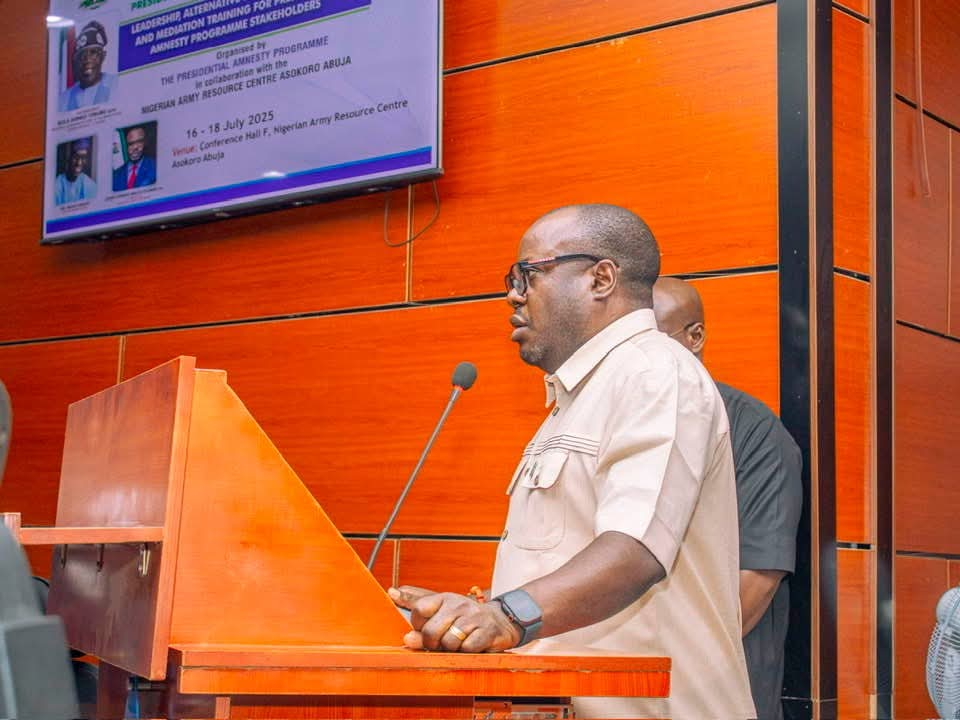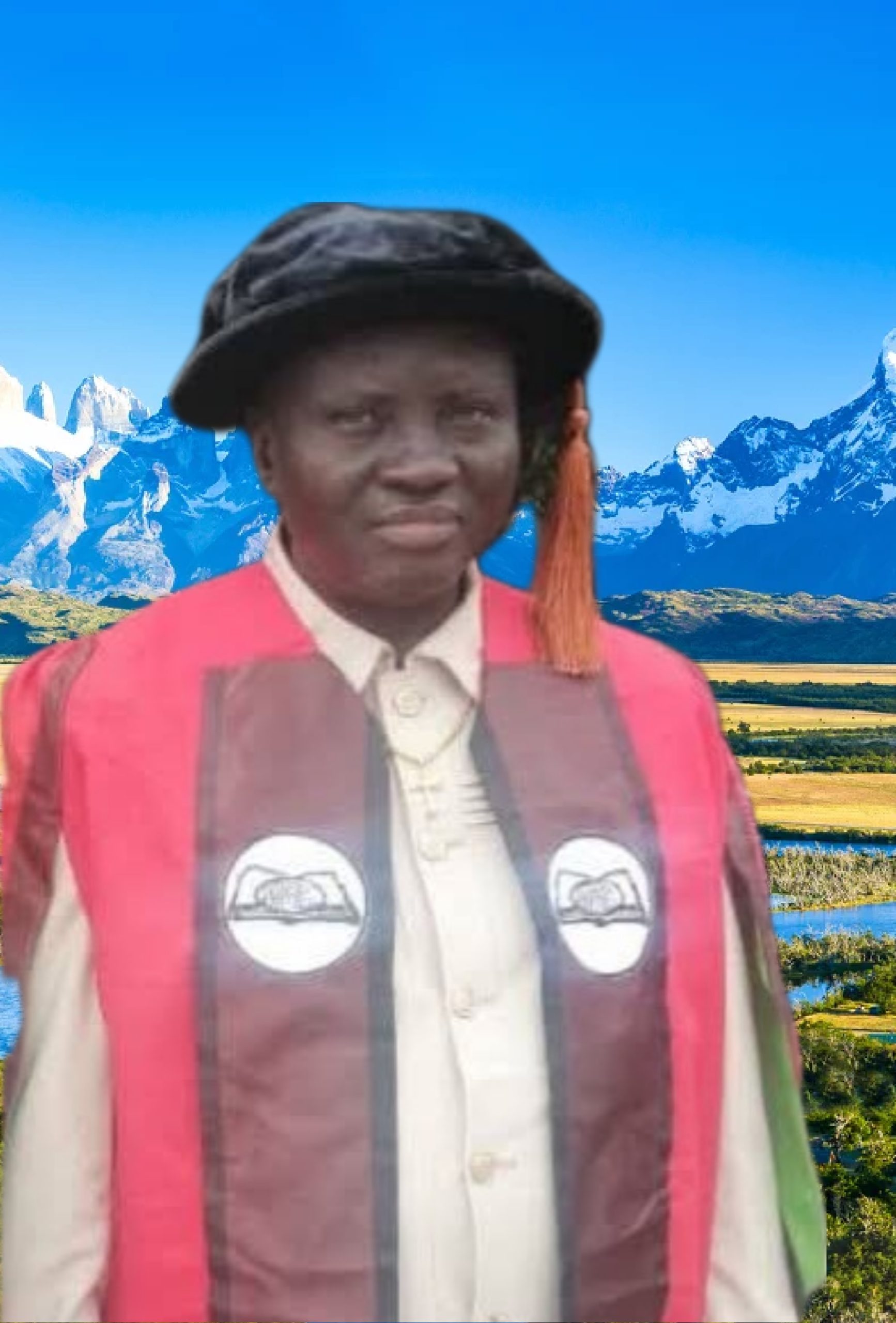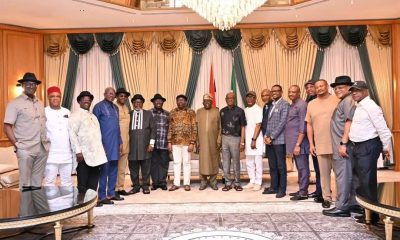Columns
Rivers State Governance: The Need for Stability and Independent Leadership – Idahosa

By Favour Bibaikefie
The political atmosphere in Rivers State has been increasingly influenced by growing tensions between Governor Siminalayi Fubara and his predecessor, Nyesom Wike, who currently serves as Minister of the Federal Capital Territory (FCT). This situation has sparked conversations about the balance between legacy influence and institutional autonomy, as well as the broader need to focus on the collective good of the people of Rivers State.
While the achievements of former Governor Wike in the state are widely acknowledged, many believe it is time for him to allow Governor Fubara the freedom to fully execute his duties without undue interference. Below, we explore the evolving dynamics and the pressing need for a governance framework rooted in respect and progress.
Governor Fubara’s Acknowledgment of Wike’s Legacy
1. Recognition at the Start of His Tenure
Governor Fubara, upon his inauguration on May 29, 2023, openly expressed gratitude to Wike for his contributions to the state. In his inaugural address, he emphasized the importance of building on Wike’s legacy, signaling an intention for continuity and mutual cooperation.
2. Significant Appointments with Wike’s Influence
In the early months of his administration, Governor Fubara reportedly sought input from Wike in several critical decisions. These included:
The appointment of the Chairman of the Traditional Rulers Council.
The selection of the Secretary to the State Government (SSG).
The nomination of key legislative positions such as Speaker, Deputy Speaker, and House Leader.
The composition of the State Executive Council, including Commissioners.
These moves underscored Governor Fubara’s respect for Wike’s network and experience as part of ensuring a smooth transition.
3. Accommodations in Government Operations
Reports suggest that Wike’s influence extended to operational aspects of governance. For instance, project approvals and other key decisions were often attributed to Wike’s input. Additionally, it is noted that Wike’s family continued to reside in the official Governor’s residence, while Fubara occupied alternative accommodations within the Government House complex. This situation demonstrated an unusual level of deference and patience from the current governor.
A Call for Independent Leadership
While Governor Fubara’s efforts to maintain a respectful and collaborative relationship with Wike are commendable, it is imperative for Rivers State to transition into a new phase of governance that prioritizes institutional autonomy.
1. Upholding the Democratic Mandate
As the elected governor, Fubara’s primary responsibility is to the people of Rivers State. Effective leadership requires the ability to independently make decisions that align with the electorate’s expectations, free from external pressures.
2. Wike’s National Role
As FCT Minister, Wike holds a critical national position that demands his full attention. Balancing this role with involvement in Rivers State politics risks diluting his effectiveness in both capacities and undermines his standing as a statesman.
3. Ensuring Institutional Balance
Rivers State belongs to all its residents, not any single individual or political faction. Governance thrives when leaders respect institutional boundaries and prioritize collective progress. Overreach by any one actor could erode public confidence and stall development.
The Way Forward
1. Supporting Governor Fubara
The people of Rivers State must unite behind their governor, providing constructive feedback and engaging actively in the governance process. This solidarity is key to ensuring the state’s continued progress.
2. Allowing Wike to Focus on National Assignments
Wike’s ministerial role offers an opportunity to further enhance his legacy on a national scale. By dedicating himself to the development of the FCT, he can leave a lasting impact without compromising the autonomy of Rivers State’s leadership.
3. Respectful Collaboration
While collaboration between past and current leaders is beneficial, it should be based on mutual respect and a shared vision for the state. Governor Fubara should be allowed the space to implement his policies, while Wike’s insights can be sought when necessary.
Conclusion
Rivers State stands at a crossroads where the decisions of its leaders will shape its future trajectory. History shows that governance driven by collaboration and respect for democratic principles fosters progress, while undue interference can hinder development.
Governor Siminalayi Fubara has shown remarkable patience and respect for his predecessor, Nyesom Wike. Now, it is time for him to be empowered to lead independently, while Wike focuses on his national responsibilities. Together, their cooperation—rooted in boundaries and mutual respect—can ensure that Rivers State remains a model of progress and good governance in Nigeria.
Columns
Chief Denis Otuaro, the Guiding Star of PAP

By: Professor Binebai
The Niger Delta has found a beacon of hope in Chief Dr. Dennis Otuaro, a leader of unimpeachable integrity, courage, and vision. As the helm of the Presidential Amnesty Programme (PAP), he has emerged as a champion of transformation, inspiring a region and a nation with his unwavering commitment to empowerment and progress.
In the realm of Nigerian leadership, there are those who leave an indelible mark on the sands of time, and Chief Dr. Dennis Otuaro is one such luminary. As the helm of the Presidential Amnesty Programme (PAP), he has etched a narrative of hope, redemption, and triumph, illuminating the path for the people of the Niger Delta. This tribute is a celebration of his extraordinary leadership, vision, and unwavering commitment to the cause of empowering the youths and transforming the region.
Chief Denis Otuaro’s stewardship of the Presidential Amnesty Programme (PAP) has indeed been a renaissance, a majestic sunrise after a long, dark night, as he infuses the initiative with the radiance of a new dawn.
Like the mythical Anansi, the wise and cunning spider of West African folklore, Otuaro’s leadership has woven an intricate web of hope and opportunity, capturing the challenges of the Niger Delta and transforming them into a rich mosaic of promise and progress. His vision, akin to that of the venerable Oracle of Delphi, has deciphered the complexities of post-conflict reconstruction, guiding the demobilised youths through the labyrinth of uncertainty, and into the bright light of empowerment and redemption.
Otuaro’s journey has been sustained by a resolute commitment to the cause, his leadership style a masterful blend of courage, wisdom, and compassion. His tenure has been marked by a symphony of progress, as the PAP, under his guidance, has orchestrated a harmonious balance of pacifism and pragmatism, transforming the region into a veritable Garden of Eden.
Like Athena, the Greek goddess of wisdom, Otuaro wields the power of transformation, his touch turning the arid landscape of despair into a lush oasis of hope and prosperity. His leadership has become a byword for sagacity, a testament to the transformative power of vision, courage, and compassion.
In the pantheon of Nigerian leaders, Otuaro’s name shall be etched alongside the greats, his legacy a shining testament to the indomitable human spirit, as he continues to weave a new narrative of hope, redemption, and triumph for the people of the Niger Delta.
The Niger Delta has found a leader of repute, a leader of courage, a leader of transformation, a leader of goodwill in the PAP. Let egocentric economic buccaneers and demonic agencies stop their campaign of calumny against this leader of glory.
To those who seek to undermine his efforts, we say: let envy and malice be silenced! Let the progress of the Niger Delta be the benchmark for greatness! Let Otuaro’s leadership be the inspiration for a new generation of leaders!
Columns
A Legendary Legacy: The Enduring Odyssey of High Chief (Dr.) Government Oweizide Ekpemupolo

By: Professor Ben Binebai
In the realm of Nigerian leadership, one name resonates with mythical significance – High Chief (Dr.) Government Oweizide Ekpemupolo, affectionately known as Tompolo. Born on 12 April 1971, in Warri, Delta State, Tompolo has etched his name in the annals of history, leaving an indelible mark on the Niger Delta region. As a former militant commander of the Movement for the Emancipation of the Niger Delta (MEND) and chief priest of the Egbesu deity, he has navigated the treacherous waters of war and peace, leveraging his remarkable journey to bring succour and development to his people.
Tompolo’s metamorphosis from a militant leader to a peace advocate is a testament to his unwavering commitment to the progress of the Niger Delta. His decision to embrace the Amnesty Programme in 2009 marked a turning point, as he laid down arms and picked up the mantle of transformation. Today, he is revered as a hero, celebrated for taming the turbulent waters of the Creek boys and settling major political crises in the region. By putting the Ijaw image on the Nigerian map, Tompolo has redefined the narrative, showcasing the rich cultural heritage and resilience of the Ijaw people to the world.
A nationalist and statesman emerging from the boiling pot of agitation in the Niger Delta, Tompolo has consistently demonstrated his commitment to the development and progress of his people. His agency operates in close collaboration with the government, working tirelessly to implement projects and initiatives that benefit the Niger Delta region. His leadership style is characterised by quiet strength, strategic thinking, and an unwavering commitment to the progress of his people. His efforts have earned him recognition and accolades from various quarters, solidifying his position as a dependable pillar of the Ijaw nation.
As the last voice of the Ijaw nation, Tompolo’s legacy continues to inspire hope and progress for generations to come. With institutions established for national economic stability and prosperity, his impact will be felt for years to come. Tompolo’s story serves as a beacon of hope and resilience, inspiring his people to strive for greatness.
God bless this emergent leader of the Ijaw nation.
Columns
YOUNA: WARRI CRIES FOR PEACE AND JUJUSTICE

By: Ben Binebai
In the Niger Delta region of Nigeria, a city cries out for peace, justice, and unity. Warri, a land of rich cultural heritage and economic significance, has been plagued by recurring crises, sparked by provocative actions and claims of ownership by the Itsekiri group. The cry of Warri is a call to action, a reminder that our diversity is a strength, not a weakness, and that our common humanity is worth fighting for.
The Ijaw, Urhobo, and Itsekiri communities have coexisted in Warri for centuries, sharing a rich cultural heritage and a deep connection to the land. Occasionally uniting but deeply disunited because power and hegemony have often overshadowed their shared humanity, the people of Warri yearn for a future where their differences are celebrated, and their commonalities are the foundation of their unity. Warri’s significance extends beyond its current boundaries, as it has been a hub of economic and cultural activity for centuries. Before 1952, Warri was a thriving commercial centre, with the Ijaw, Urhobo, and Itsekiri communities contributing to its growth and development.
The city’s strategic location and access to the Niger Delta’s vast resources made it an attractive location for trade and commerce. Understanding Warri’s rich history and cultural heritage is essential to finding a lasting solution to the crisis.
It is time for truth to prevail to offer a lasting solution to the Warri crisis. The canoe of godfatherism should be withdrawn for the rule of law and for peace and progress to triumph.
The lie of exclusive ownership of Warri resists termination due to several factors, including:
Outdated court judgments: The Itsekiri establishment continues to rely on outdated court judgments, such as the 1925 judgment, to support their claim of ownership, despite subsequent judgments repudiating its validity.
Lack of political will: Successive governments have failed to address the problem and take the right and just decision, allowing the crisis to persist.
Absolutist claims: The Itsekiri claim is absolutist, while the Urhobo and Ijaw claims are limited, recognising ownership of portions of Warri by other communities.
Historical narratives can be deeply ingrained*: People’s understanding of their history and identity can be shaped by long-standing narratives, making it hard to change their perspectives.
Emotions and biases can override facts: When emotions and biases are strongly tied to a particular narrative, people may resist changing their views, even in the face of contradictory evidence.
Power dynamics can influence narrative control: Those in positions of power may use their influence to shape and maintain certain narratives, making it harder to correct lies and misconceptions.
Moreover, leadership plays a crucial role in shaping the future of Warri. As the saying goes, “When leaders refuse to embrace sacrifice, society dies.” Leaders who prioritise the greater good, make tough decisions, and invest in the future can help build a more harmonious and prosperous society. It is time for the leaders of Warri to put the needs of their people first and work towards a brighter future.
The cry of Warri is a call to action, a reminder that our diversity is a strength, not a weakness. Let us work towards a brighter, more harmonious future, where the beauty of our differences is celebrated, and our common humanity is cherished. May the cry of Warri be heard, and may we rise to the challenge of building a better tomorrow for all its people.




